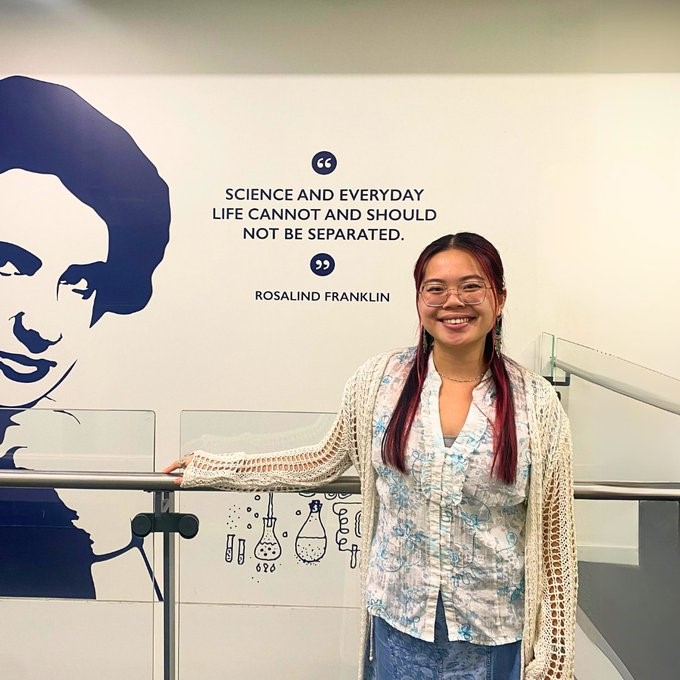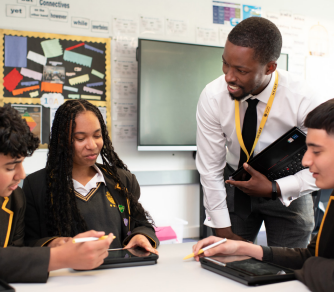Celebrating the diversity of our Teach First trainees
At Teach First, we believe education is the most powerful tool to help every child fulfil their potential. We believe everyone deserves access to a good education and know the impact a great teacher can have.
As the latest recruitment figures are released for 24/25, our Executive Director of Programme Talent, Paddy Dempsey, discusses the impact of Teach First.
Today the government has published their latest Initial Teacher Training Census, highlighting how many teachers they have recruited overall this year through the Training Programme.
We are proud of the role we have played and in what remains a tough market for recruitment and it is amazing to see 1,415 trainee teachers join the Teach First Training Programme this year.
This is our largest cohort for several years and it is incredibly rewarding to know these individuals will support thousands of pupils, in hundreds of schools.
These trainees will work exclusively in schools serving low-income communities, where the teacher recruitment challenges bite the hardest.
The stats highlight the impact of Teach First, with our trainees making up 25% of all business studies teachers, 15% of all English teachers and 14% of all biology teachers. Our trainees also make up 8% of all STEM teachers and within our own stats, 35% of our secondary cohort are teaching STEM subjects and overall, 6% of new teachers have come through our Training Programme.
We are also particularly proud of the diversity in this year’s cohort. Teachers play an integral role in the lives of many young people, often becoming role models, helping ignite passion and unlock potential.
As we work to support such diverse communities, it is essential our pupils have teachers and role models who represent them. This way, more and more pupils will have role models they can relate to, to help inspire them inside the classroom and beyond.
This year’s cohort is our most diverse to date:
37%
come from ethnic minority groups (compared to 27% of all routes this year)
20%
identify as LGBT
28%
were eligible for free school meals as pupils
You can’t be what you can’t see
We know the difference this will make, and have some great teachers who have shared their experiences:
Aqueel Morgan, Teach First Ambassador, physics teacher and Head of Year 7 at Uxbridge High School, London:
“Growing up Black and in a low-income community, I was lucky to be surrounded by brilliant role models, from my parents to my inspiring teachers who all instilled a sense of pride in who I was and the community I came from. Now, as a physics teacher and Head of Year, I know the importance of being a positive role model myself. When leading my physics lessons, I’m showing my pupils that they can thrive in the world of STEM."
“Having grown up only twenty minutes away from the school I now teach in, I’m also able to relate to my pupils because I lived in a similar household, used the same slang and faced some of the challenges they do. This helps me to foster positive relationships built on personal understanding and support my pupils who are struggling to stay engaged in their education to get back on track."
“Underrepresented communities need to see themselves in places of leadership to embark on similar journeys.”

Nicole Chiang, Teach First trainee science teacher at Kensington Aldridge Academy, London:
“Growing up with immigrant Chinese and Vietnamese parents, I always wished I had a teacher who I related to. That’s why I try to positively acknowledge my pupils’ different ethnicities and our community when teaching science, whether that’s sharing my own background when appropriate, or linking various models and analogies to their experiences. It’s all about ensuring they feel a part of their learning, which is so important particularly in STEM subjects, due to the inequalities in the sector."
“I’m so proud to be a role model within my school community. While I may not have grown up in a similar circumstance to most of the children I teach, suitably weaving in my own individual experiences strengthens my approaches and helps me to make the positive impact I was aiming for.”

Michael Kolawole-Sharp, Teach First Ambassador, Assistant Principal and computer science teacher at Park Academy West London, Hillingdon:
“Students learn the best when they have a strong positive relationship with their teacher. Growing up as a Black African pupil, who was on free school meals, I really valued having teachers that looked like me and who I could relate to, so always think of its importance now that I’m a Senior Leader. Equally, it can be more difficult to imagine yourself as a teacher or school leader if you don’t see those you identify with already in these roles."
“The teaching profession needs a broad spectrum of passionate people who can draw from different experiences. It’s these individuals that truly inspire pupils, especially those from low-income communities, to see themselves in roles of leadership and successful pathways.”
Challenges ahead
The challenges in teacher recruitment remain substantial. Much remains to be done to attract high-quality teachers, especially to areas where they’re needed most.
The graduate market has become increasingly competitive – both in terms of the jobs available and the salaries attached to them.
Our recent research on Gen-Z motivations for joining the teaching workforce found that 47% of Gen Z think a high-longer term salary is the most important aspect to a future career.
We want to see the government establishing a route to increase teacher and trainee teacher salaries. As graduate salaries continue to increase, the gap will continue to widen.
Flexibility is also another key area that must be addressed. Conditions in the teaching profession have failed to keep pace with what the next generation of workers crave in a career – and what they can find in other sectors.
A good work life balance (56%) and flexible working (36%) are among the top priorities among Gen Z when selecting a career, both of which are hard to attain through teaching in most schools.
Time and time again we see schools implementing flexible working practises and it being hugely beneficial for both recruitment and retention. We want to see a “working flexibility” entitlement for every teacher.
Feel inspired?
Find out more about our latest research in 'Tomorrow’s Teachers' here.
Or want to find out more about becoming a Teacher? Visit our Training Programme page here.
